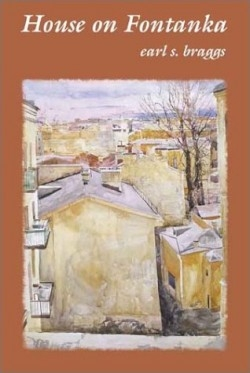It looks like you've stumbled upon a page meant to be read by our code instead of viewed directly. You're probably looking for this page.
House on Fontanka
“I know that when the storm of Lenin and Stalin came / to outrage itself, poet masses left and Akhmatova / alone remained,” writes Braggs in the title poem of his latest collection. He is in the house where the great Russian poet once lived and worked, and from this vantage point he comes face to face with one of his muses. Supported by a fellowship from the University of Tennessee at Chattanooga, Braggs traveled to Russia to write about the figures, places, and moments in literary history that tell the haunting, incredible story of Russia and poetry during the last century.
Re-envisioning the details of a dark time, he writes intimate poems as if he were channeling the long dead poets of those years when the likes of Osip Mandelstam waited behind locked doors for the police to haul him away for his criticism of Stalin. Braggs walks through Red Square, the city of revolutions and Peter the Great. He writes about the River Neva, duels to the death, food lines, and the beautiful women that inspire the multitude of conversations inside his head. He touches the surfaces upon which indelible poems were written, in small houses where secrets are kept in walls and woodstoves.
This book is an expression of love, including poems in the form of letters and postcards, and narrative accounts of important historical events and biographies. It is a lyrical lesson in the importance of poets who bring their work to the service of social and political protest. Braggs writes:
Nothing has changed, snow beats / and breaks window panes, the unbearable heaviness / of death // creases us all but just a little. It is only natural, / however, we come to expect, tomorrow a poet / will be arrested. The day after a poet will be executed. / The following day the newspaper will be silent.
Having been so taken by the works of many poets who met with dastardly ends, Braggs pays homage, entering an imaginative space that allows him to write the stories and places that gave shape to Russia’s poetic tradition. The love that manifests through his language is really devotion of the religious sort. In this sense, the Russian trip is his pilgrimage, an opportunity for a deepening of his faith.
Though he is not spare on emotion or the language of praise, Braggs manages to escape gratuitous nostalgia. Despite being a book of average length, it possesses epic tendencies by virtue of its comprehensive treatment of an important subject. House on Fontanka would be of particular interest to readers who have some knowledge or affection for Russian poetry.
Reviewed by
Holly Wren Spaulding
Disclosure: This article is not an endorsement, but a review. The publisher of this book provided free copies of the book to have their book reviewed by a professional reviewer. No fee was paid by the publisher for this review. Foreword Reviews only recommends books that we love. Foreword Magazine, Inc. is disclosing this in accordance with the Federal Trade Commission’s 16 CFR, Part 255.
